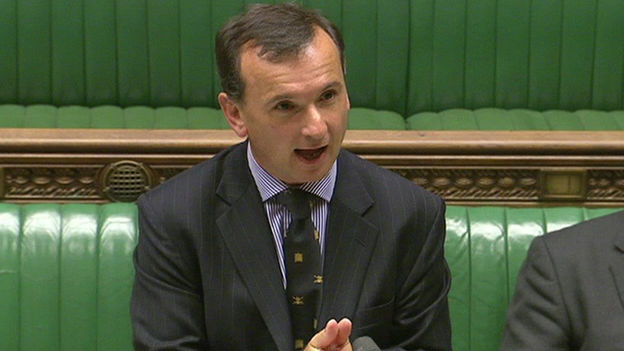Wales Bill nears the end of its Commons journey
- Published
- comments

'We're fed up talking about constitutional settlements' - Alun Cairns.
The Wales Bill is nearing the end of its journey through the House of Commons. MPs are currently debating a range of amendments to legislation that is largely unchanged since it was introduced in parliament (although very different from the draft version of the legislation).
Some of the issues are familiar - the issue of a separate legal jurisdiction is occupying MPs at the time of writing. Welsh Secretary Alun Cairns has rejected that proposal despite a Plaid Cymru protest that the Welsh Assembly is the only legislature in the world without a separate jurisdiction.
The debate has followed a familiar routine. Plaid Cymru cut and pasted an amendment from the Welsh Government's own alternative Wales Bill and challenged Welsh Labour MPs to vote for it. It can be an effective tactic in highlighting differences between Labour in Wales and in Westminster.
Ahead of the debate, Mr Cairns challenged the Welsh Government to use its new powers "to make a difference" and make the National Assembly matter to the people of Wales. Mr Cairns said people were "fed up" talking about the constitution and it was time to use the powers contained in the Bill effectively.
The Bill transfers power over fracking and road speed limits as well as allowing the National Assembly to set the voting age for Welsh elections, call itself a parliament and decide how many members it should have. It removes the requirement to hold a referendum before the Welsh Government gets the power to vary income tax rates.
'Accountable'
Mr Cairns told BBC Wales: " It's about making an Assembly that matters to the people of Wales. For too long we've been debating the constitution, for too long we've been debating minutiae about governance issues. This is now empowering the WG to act on the things that matter to people in Wales. They will be truly accountable, truly responsible, so they will rightly get the credit when things go right but they will also be held to account when things aren't going the way in which they deemed in their policies.
"My message is: take these powers, use them effectively to make a difference. We're fed up talking about constitutional settlements. This is a Bill that will give them the right powers and it is up to them to make the most of them and use them properly to benefit the people in Wales."
Plaid Cymru say the Bill still leaves Wales behind Scotland and Northern Ireland. Jonathan Edwards said: "Both those nations have far more powers than Wales at the moment and this Wales Bill won't take us anywhere near where Scotland is at the moment."
Mr Cairns's former special adviser Tomos Dafydd echoed his former boss's tone in an article, external that suggested tax-varying powers would change the political culture in a Wales where "our political class remain fixated on petty constitutional squabbles".
For Labour, Shadow Welsh Secretary Paul Flynn dampened hopes that this Wales Bill might draw a line under those squabbles. He told MPs: "This is one of those occasions we turn to every four or five years in this House and we're doomed to do it, I'm afraid, for the foreseeable future because this is not the final word."
'Consensus'
But he tempered that prediction with some warm words for minister: "I'm grateful, I think we all are, to the amount of consensus there is on the Bill - and the main features of this Bill are progressive. They'll introduce a stability and a new dignity to the Assembly which is winning more respect for its position virtually every time we come and have these Bills here."
He added: "There is in general agreement and thanks to the government fore being pragmatic enough and generous enough to accept reasonably many of the amendments put down."
Despite criticism of the timidity of the Bill, Mr Flynn praised a recent appointment on the government side - that of "a young, thrusting MP" [Glyn Davies] as Mr Cairns's parliamentary private secretary.
"It's nice to know that the spirit of giving youth a chance on this front bench is extended to the honourable gentleman too."
The Montgomeryshire MP - nine years Mr Flynn's junior - grinned broadly.